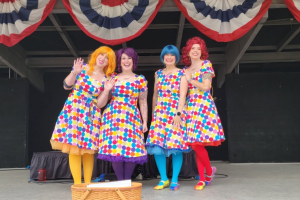Teach yourself the ABCDE’s of skin cancer this summer
Published 1:30 am Wednesday, July 22, 2020
By Lauren Gresham / Special to The Herald
Since July is Skin Cancer Awareness Month, I thought I would take this time to teach you the ABCDEs of skin cancer detection, as well as give you a few tips for picking out sunscreens.
I love the feeling of the warm summer sun on my skin. It is one of life’s great pleasures. I also love having healthy, vibrant skin. Part of having healthy skin is becoming familiar with your skin so you can recognize if anything abnormal is occurring.
According to The Skin Cancer Foundation, one in five Americans will develop some type of skin cancer by the age of 70. Most of these skin cancers are preventable and treatable, if caught early enough. This is why I recommend that all my patients memorize the ABCDEs of skin cancer.
The ABCDEs of skin cancer is a mnemonic device that you can use to evaluate any mole on your body. Moles that have more abnormal qualities when evaluated by the ABCDEs are more likely to be problematic.
If you find that you have moles that are abnormal — first, stay calm. A mole that has abnormal qualities does not automatically mean you have skin cancer. What it does mean: You should strongly consider seeing your doctor and getting a referral for a dermatologist.
The ABCDEs of skin cancer:
A: Asymmetry. One side of the mole doesn’t match the other side. Moles that are asymmetrical are more concerning than lesions that are symmetrical.
B: Border. If your mole has an irregular border versus a clean, crisp border, that is more concerning. If it looks like it is spilling color onto other parts of your skin, consider this abnormal.
C: Color. A mole that has various colors is more concerning than a mole with a uniform color. And moles that are black or purple are often considered abnormal as well.
D: Diameter. Any mole larger than the size of a pencil eraser should be further evaluated.
E: Evolving. Moles that are evolving and changing are more concerning than moles that have stayed exactly the same for years. In fact, this is one of the most important variables to consider. It’s a great idea to take a picture of your moles so it’s easier to track changes over your lifespan.
Again, if you just discovered several moles on your skin that fall into the abnormal category, try not to panic. Remember, most skin cancers are fairly easy to treat if they are caught early, and having an abnormal mole is not a skin cancer diagnosis. A dermatologist will evaluate the mole and take a small skin sample if needed for further evaluation.
If you do not already wear sunscreen when outside, this is a good reminder that many skin cancers start because of DNA damage from the sun’s UV light. Picking sunscreen can be confusing, and there has been a lot of bad press about sunscreen because of damage to coral reefs.
Here are just a few brief tips about how I make my choice of sunscreens:
There are two types of sunscreens: chemical and barrier. Chemical sunscreens create a chemical reaction within your skin to block the UV light. These sunscreens are more controversial because of supposed negative health effects, and they also tend to be the types of sunscreens that damage coral reefs.
If you read the ingredients list and it has a bunch of fancy chemical names, it is likely a chemical-type sunscreen.
Barrier sunscreens use tiny particles of zinc oxide or titanium dioxide to physically reflect the rays off your skin. These are less associated with negative effects to coral reefs, but they tend to make your skin pasty white and can be more sticky to apply.
I prefer barrier sunscreens because I like to be conservative with any chemicals I apply to my skin.
The other major tip is to check out a sunscreen’s ratings at www.skindeep.com before you buy. Skin Deep is a part of the Environmental Working Group, a nonprofit organization that independently rates various skin (and home) products on the market.
Unfortunately, government regulation is not particularly strict about the chemicals that may be added to skin care. In fact, it is often up to the consumer to educate themselves about what exactly they are buying and using on their bodies.
Skin Deep makes this process much easier through their product ratings. Using the website to help you select your sunscreen will ensure that you are getting something that is healthy for you — which is the reason you are wearing it in the first place, right?
I hope you are having a lovely summer full of play in the sun and great skin protection!
Dr. Lauren Gresham is a naturopathic physician and a community health education specialist. She holds a master’s degree in public health. Learn more about her by visiting www.totallylovablenaturopathic.com.




